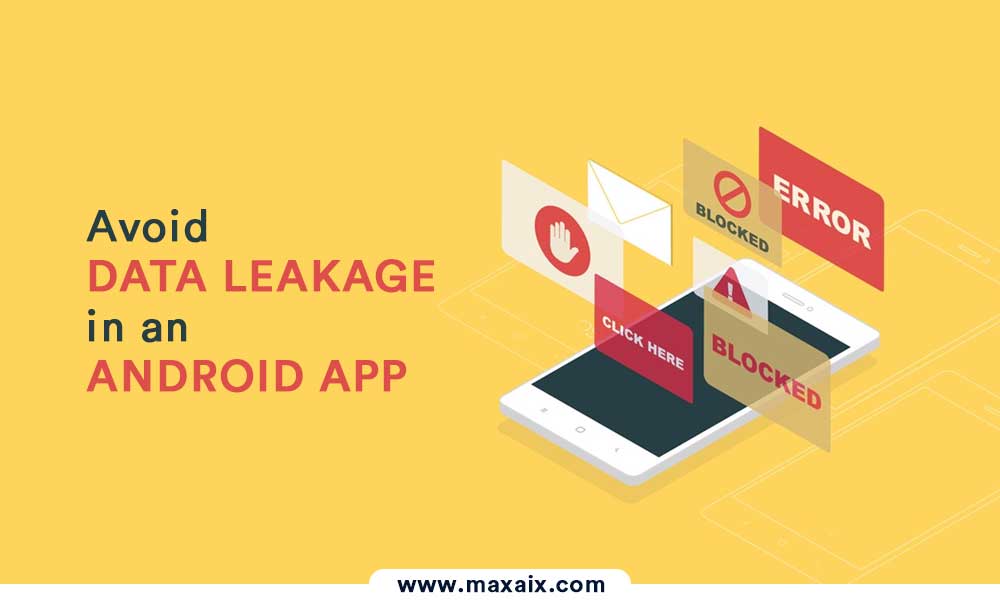8 Proven Ways to Avoid Data Leakage in an Android App

Ensuring the security of user data is paramount in mobile app development, particularly for Android applications, where data leakage poses significant risks to users’ privacy and security. Here are eight proven strategies to prevent data leakage and safeguard sensitive information in your Android app:
What is a Data Leak?
A data leak, often referred to as a data breach, occurs when sensitive information is unintentionally exposed to unauthorized parties. This can include personal data, financial records, login credentials, or any confidential information that, when accessed by malicious entities, can lead to severe consequences for individuals and businesses.
Disadvantages of Not Avoiding Data Leakage in an Android App
The disadvantages of not avoiding data leakage in an Android app are extensive and can have detrimental effects on users, businesses, and overall cybersecurity:
Compromised User Privacy: Users’ sensitive information, such as personal details and financial data, can be exposed, leading to privacy concerns.
Reputation Damage: Data breaches can significantly damage the reputation of an app or the organization behind it, eroding trust among users.
Financial Loss: Businesses may incur significant financial losses due to legal repercussions, compensation claims, and costs associated with resolving the breach.
Regulatory Consequences: Failure to protect user data may result in regulatory fines and penalties, especially with the stringent data protection laws in place.
Increased Vulnerability: Data leaks make an Android app more susceptible to further cyber attacks, as hackers exploit weaknesses exposed during the breach.
Growth of Data Leakage in an Android App in the World of Applications
The growth of data leakage in the world of applications has been propelled by the increasing reliance on mobile apps for various services. As the number of Android app users continues to rise globally, so does the attractiveness of these apps to cyber criminals. The interconnected nature of applications, combined with evolving hacking techniques, contributes to a growing trend of data breaches, emphasizing the critical need for robust security measures.
8 Proven Ways to Avoid Data Leakage in an Android App
a. Secure Data Encryption:
Details: Implement strong encryption algorithms to protect sensitive data, both in transit and at rest.
Popularity: Encryption is widely adopted due to its effectiveness in rendering data unreadable without the appropriate decryption key.
b. Use HTTPS Protocol:
Details: Ensure that all data transmissions between the app and the server are encrypted using the HTTPS protocol.
Popularity: HTTPS is a standard security measure for securing communication channels, preventing data interception by malicious entities.
c. Data Minimization Principle:
Details: Only collect and store the minimum amount of data necessary for app functionality.
Popularity: Adhering to the data minimization principle reduces the risk associated with the unnecessary storage of sensitive information.
d. Regular Security Audits:
Details: Conduct regular security audits to identify and rectify potential vulnerabilities.
Popularity: Routine security audits are essential for staying ahead of evolving threats and maintaining a robust defense against data leaks.
e. Authentication and Authorization:
Details: Implement strong authentication mechanisms and ensure proper authorization for user access.
Popularity: Secure authentication and authorization prevent unauthorized access, protecting user data from unauthorized users.
f. Secure Backend Storage:
Details: Employ secure backend storage solutions with access controls and encryption.
Popularity: A secure backend is crucial for protecting stored user data and preventing unauthorized access.
g. Update and Patch Regularly:
Details: Keep the app and all dependencies up to date with the latest security patches.
Popularity: Regular updates and patches address known vulnerabilities, enhancing the app’s overall security posture.
h. Implement Two-Factor Authentication (2FA):
Details: Offer users the option to enable 2FA for an additional layer of security.
Popularity: 2FA has become a standard security feature, adding an extra barrier against unauthorized access.
Why is Each Way Popular?
a. Secure Data Encryption:
Popularity: Encryption is popular due to its effectiveness in rendering data unreadable without the appropriate decryption key, ensuring robust protection against unauthorized access.
b. Use HTTPS Protocol:
Popularity: HTTPS is a standard security measure, widely adopted for securing communication channels and preventing data interception by malicious entities.
c. Data Minimization Principle:
Popularity: Adhering to the data minimization principle reduces the risk associated with unnecessary data storage, aligning with privacy-centric app development practices.
d. Regular Security Audits:
Popularity: Routine security audits are popular for staying ahead of evolving threats and maintaining a robust defense against potential data leaks.
e. Authentication and Authorization:
Popularity: Secure authentication and authorization are essential for preventing unauthorized access, ensuring the protection of user data.
f. Secure Backend Storage:
Popularity: A secure backend is popular for safeguarding stored user data and preventing unauthorized access to sensitive information.
g. Update and Patch Regularly:
Popularity: Regular updates and patches are popular for addressing known vulnerabilities, enhancing the app’s overall security posture.
h. Educate Development Teams:
Popularity: Ongoing security training is popular for ensuring that the development team is well-equipped to identify and mitigate security risks.
i. Implement Two-Factor Authentication (2FA):
Popularity: 2FA is popular for adding an extra layer of security, reducing the risk of unauthorized access to user accounts.
j. Privacy Impact Assessment:
Popularity: Proactive privacy impact assessments are popular for identifying and addressing potential risks to user privacy before they escalate.
How Does Maxaix Development Help to Expand Your App Journey?
Maxaix development offers a range of benefits to enhance your app journey and fortify your Android app against data leaks:
Robust Security Framework: Maxaix employs a robust security framework to identify and address potential vulnerabilities, ensuring a secure app development process.
Comprehensive Testing: Rigorous testing processes, including penetration testing and vulnerability assessments, are integral to Maxaix development, guaranteeing that your app is resilient to cyber threats.
Adherence to Best Practices: Maxaix development follows industry best practices for secure coding, encryption, and data protection, minimizing the risk of data leakage.
Ongoing Security Updates: Maxaix provides continuous support and updates to address emerging security challenges, ensuring that your app remains secure throughout its lifecycle.
Expertise in Compliance: Maxaix development understands and adheres to data protection regulations and privacy laws, ensuring that your app remains compliant with relevant standards.
5 Reasons: Why Do People Need to Avoid Data Leakage in an Android App?
Protecting Privacy: Users value the protection of their personal information, and avoiding data leakage ensures privacy.
Building Trust: Apps that prioritize data security build trust among users, enhancing the app’s reputation.
Preventing Financial Loss: Avoiding data breaches helps businesses avoid financial losses associated with legal repercussions and compensation claims.
Ensuring Regulatory Compliance: Adherence to data protection laws is crucial to avoid regulatory fines and penalties.
Maintaining App Reliability: Users prefer apps that are reliable and secure, making data protection essential for app success.
Challenges of Implementing Android Applications Without Data Leakage
Challenges of implementing Android applications without data leakage include:
Security Risks: Developing leak-proof apps requires a comprehensive understanding of potential security risks and effective mitigation strategies.
User Experience Impact: Striking a balance between robust security measures and a seamless user experience can be challenging.
Resource Intensiveness: Implementing advanced security features may require significant development resources and expertise.
Continuous Adaptation: The ever-evolving nature of cyber threats demands the continuous adaptation of security measures.
Integration Complexity: Ensuring compatibility with various Android devices and OS versions adds complexity to implementation.
Frequently Asked Questions
Q1: How does code obfuscation enhance app security?
Code obfuscation makes it difficult for attackers to reverse engineer the app’s code, enhancing overall security.
Q2: Why is network encryption crucial for data security in apps?
Network encryption ensures that data transmitted between the app and servers is secure, preventing unauthorized access.
Q3: How often should an incident response plan be tested?
Incident response plans should be tested regularly through simulated scenarios to ensure effectiveness.
Q4: Are user education efforts effective in enhancing data security?
Yes, user education efforts can significantly enhance data security by promoting awareness and best practices.
Q5: What are the common challenges of implementing Android applications without data leakage?
Challenges include security risks, impact on user experience, resource intensiveness, continuous adaptation, and integration complexity.
Q6: Can Maxaix development ensure compliance with data protection laws?
Yes, Maxaix development incorporates advanced security measures to ensure compliance with data protection laws.
Q7: Why is data minimization essential for app security?
Data minimization reduces the impact of potential breaches by collecting and storing only essential data.
Q8: How does user authentication contribute to data security?
User authentication ensures that only authorized individuals have access to sensitive data, enhancing overall security.
Q9: What are the benefits of implementing secure third-party integrations?
Secure third-party integrations enhance app functionality without compromising overall security.
In Summary, avoiding data leakage in an Android app is paramount for safeguarding user privacy, maintaining trust, and ensuring the overall success of the application. By implementing proven security measures and leveraging the expertise of Maxaix development, app developers can navigate the complex landscape of data security, providing users in the United States, Canada, and the United Kingdom with a secure and reliable app experience.


